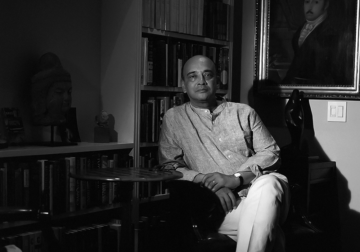Interview with David Remnick in The Paris Review:
 Fifty years ago, at a harp recital in Gloucestershire, a retired British military officer with a clipped aristo accent came across a brown-skinned teenager. “I say, old chap, do you speak English?” the officer said. As a story in Yale’s New Journal recounted, the young man—Kwame Anthony Akroma-Ampim Kusi Appiah—replied, “Why don’t you ask my grandmother?”
Fifty years ago, at a harp recital in Gloucestershire, a retired British military officer with a clipped aristo accent came across a brown-skinned teenager. “I say, old chap, do you speak English?” the officer said. As a story in Yale’s New Journal recounted, the young man—Kwame Anthony Akroma-Ampim Kusi Appiah—replied, “Why don’t you ask my grandmother?”
“Who, may I ask, is your grandmother?” the retired officer said.
“Lady Cripps.”
Lady Cripps was Isobel Cripps, the widow of Sir Stafford Cripps, a Christian socialist and Labour politician who had been chancellor of the exchequer and the Crown’s ambassador to the Soviet Union; he was known for his stalwart desire to relinquish Britain’s imperial possessions, from Calcutta to Accra. In 1953, the year of Queen Elizabeth II’s coronation, Stafford and Isobel’s daughter Peggy married Joe Appiah, kinsman of Ashanti kings and a leader of the Ghanaian independence movement. (The marriage would help inspire the film Guess Who’s Coming to Dinner.) A year later, the Appiahs’ first child and only son was born.
When Anthony was growing up in Kumasi, the capital of the Ashanti region of Ghana, the Appiah household was a locus of political and literary conversation. Among the visitors were the historian and activist C. L. R. James, the Pan-Africanist George Padmore, and the novelist Richard Wright. Joe Appiah instilled in his son a sense of global citizenship and family honor. As Anthony once wrote, “I found myself remembering my father’s parting words, years ago, when I was a student leaving home for Cambridge—I would not see him again for six months or more. I kissed him in farewell, and, as I stood waiting by the bed for his final benediction, he peered at me over his newspaper, his glasses balanced on the tip of his nose, and pronounced: ‘Do not disgrace the family name.’ Then he returned to his reading.”
More here.
